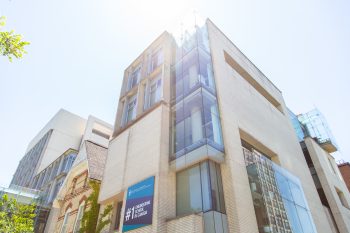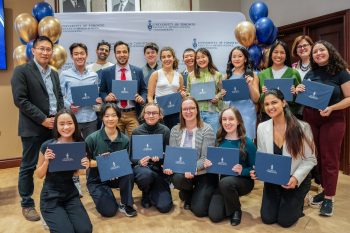Losing a limb can be devastating enough, but the high cost of a prosthetic limb makes them unavailable to many in the developing world.
Professor Jan Andrysek, a scientist at Holland Bloorview Kids Rehabilitation Hospital and Assistant Professor in the Institute of Biomaterials & Biomedical Engineering, has tackled that challenge. His solution was to develop an inexpensive artificial leg that is based on a novel control mechanism that is able to mimic the function of leg muscles. It steadies the leg when weight is placed on it without adversely inhibiting the natural patterns of walking. The price tag: $50.
“Overall, the work is expected to provide important new insights into the appropriateness and effectiveness of the technology in mitigating the disabling effects of amputations, and thus a foundation for improving rehabilitation outcomes globally,” said Professor Andrysek.
He is one of two researchers affiliated with U of T Engineering whose work was recognized today with $100,000 Rising Stars in Global Health grants by Grand Challenges Canada.
“Funding from Grand Challenges Canada will make it possible for us to work with a number of key partners around the world to clinically evaluate the new technology, and initiate steps toward making it accessible to those in need,” Professor Andrysek explained.
Dr. Lu Chen, a post-doctoral fellow in The Edward S. Rogers Sr. Department of Electrical & Computer Engineering, was also awarded a Grand Challenges Canada grant. Chen is working with Professor Stewart Aitchison and PhD Candidate James Dou on developing an inexpensive and portable HIV monitoring device for developing nations.
“A hand-held, mobile blood analyzer will allow caregivers or health workers to carry it to rural or under-served areas for HIV monitoring. Globally, the health of the HIV-positive population can be greatly improved by access to such a portable, low-cost monitoring system. Also, with our new platform technology, it will be possible to test for CD4 counts as well as malaria parasites in red blood cells,” said Chen.
Chen explained that grant will allow him to access to additional resources and facilitate field tests. “Both aspects are important to expedite our development, which will make our device available sooner for the benefit of the global community,” he said, adding, “We are pleased to see Grand Challenges Canada’s confidence in our work and appreciate their commitment to innovation.”
They are among the 15 grants announced today by Grand Challenges Canada, which is an independent not-for-profit organization. It is dedicated to improving the health and well being of people in developing countries by integrating scientific, technological, business and social innovation.
“When you look at the range of innovations and the potential those creative ideas have to make a difference, Canadians can’t help but be proud of our country’s contribution to the health and well-being of the international community,” said Dr. Peter A. Singer, CEO of Grand Challenges Canada. “Bold Canadian ideas with big impact can save lives.”



